Legal Analysis: Abdullahi's Immigration Appeal and Asylum Claim
VerifiedAdded on 2021/05/31
|22
|5757
|60
Report
AI Summary
This report presents a skeleton argument for Mr. Jamali Abdullahi's appeal against the British Home Office's decision on his asylum claim. The appellant, an Iranian national, seeks asylum and humanitarian protection, citing religious persecution and fear of returning to Iran. The report outlines the issues raised, including the denial of asylum, humanitarian protection, and the consideration of family and private life under Article 8 of the ECHR. It details the facts of the case, such as the appellant's atheism, involvement in an atheist society, and threats from Iranian authorities. The report further analyzes relevant laws, including international refugee law, the Geneva Convention, and the ECHR, with a focus on the non-refoulement principle. It presents submissions arguing that the appellant faces a well-founded fear of persecution and critiques the limitations of international refugee law, particularly in light of modern communication and evolving forms of persecution. The report concludes by referencing the ECHR and the potential for removal under exceptional circumstances, providing a comprehensive legal analysis of the case.
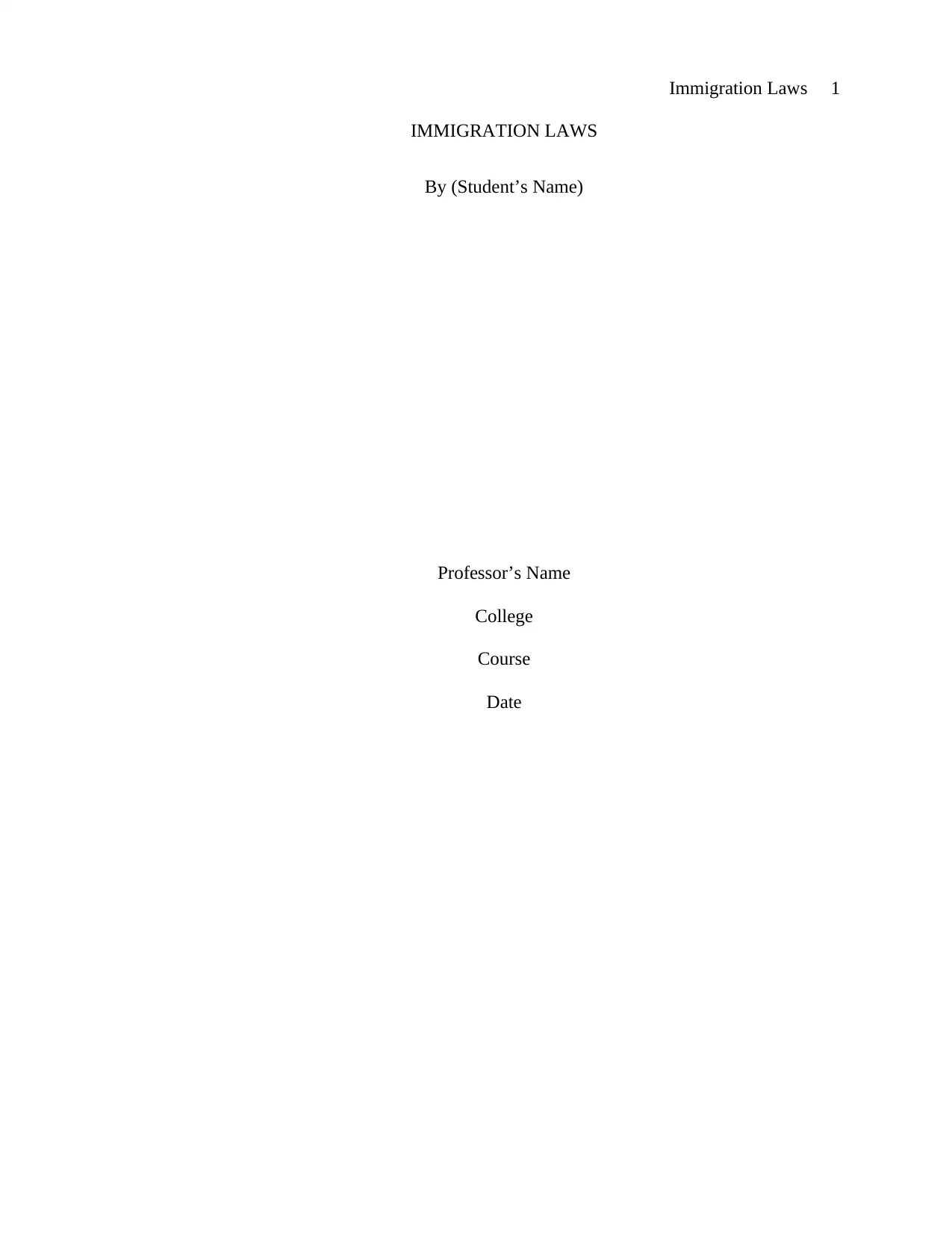
Immigration Laws 1
IMMIGRATION LAWS
By (Student’s Name)
Professor’s Name
College
Course
Date
IMMIGRATION LAWS
By (Student’s Name)
Professor’s Name
College
Course
Date
Paraphrase This Document
Need a fresh take? Get an instant paraphrase of this document with our AI Paraphraser
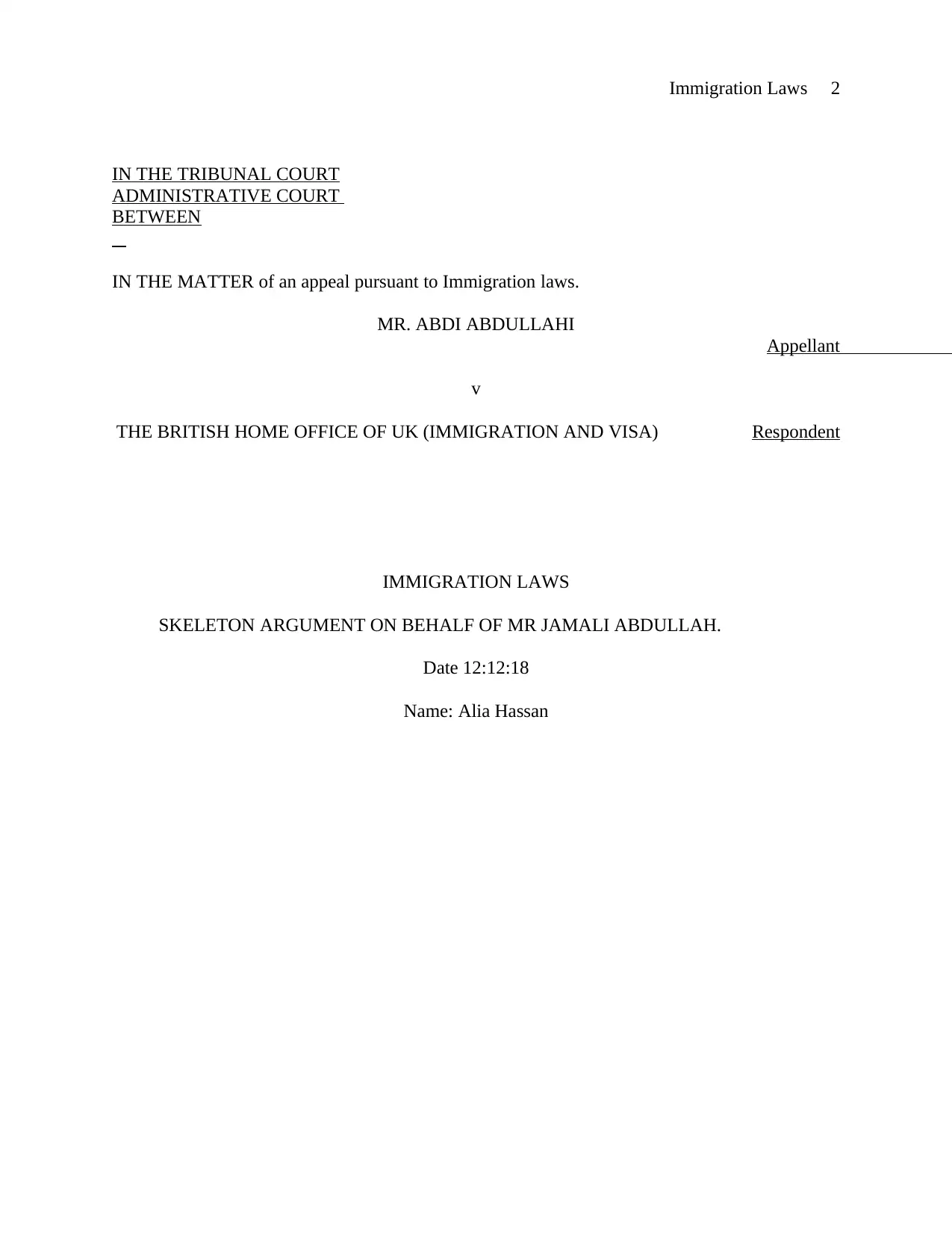
Immigration Laws 2
IN THE TRIBUNAL COURT
ADMINISTRATIVE COURT
BETWEEN
IN THE MATTER of an appeal pursuant to Immigration laws.
MR. ABDI ABDULLAHI
Appellant
v
THE BRITISH HOME OFFICE OF UK (IMMIGRATION AND VISA) Respondent
IMMIGRATION LAWS
SKELETON ARGUMENT ON BEHALF OF MR JAMALI ABDULLAH.
Date 12:12:18
Name: Alia Hassan
IN THE TRIBUNAL COURT
ADMINISTRATIVE COURT
BETWEEN
IN THE MATTER of an appeal pursuant to Immigration laws.
MR. ABDI ABDULLAHI
Appellant
v
THE BRITISH HOME OFFICE OF UK (IMMIGRATION AND VISA) Respondent
IMMIGRATION LAWS
SKELETON ARGUMENT ON BEHALF OF MR JAMALI ABDULLAH.
Date 12:12:18
Name: Alia Hassan
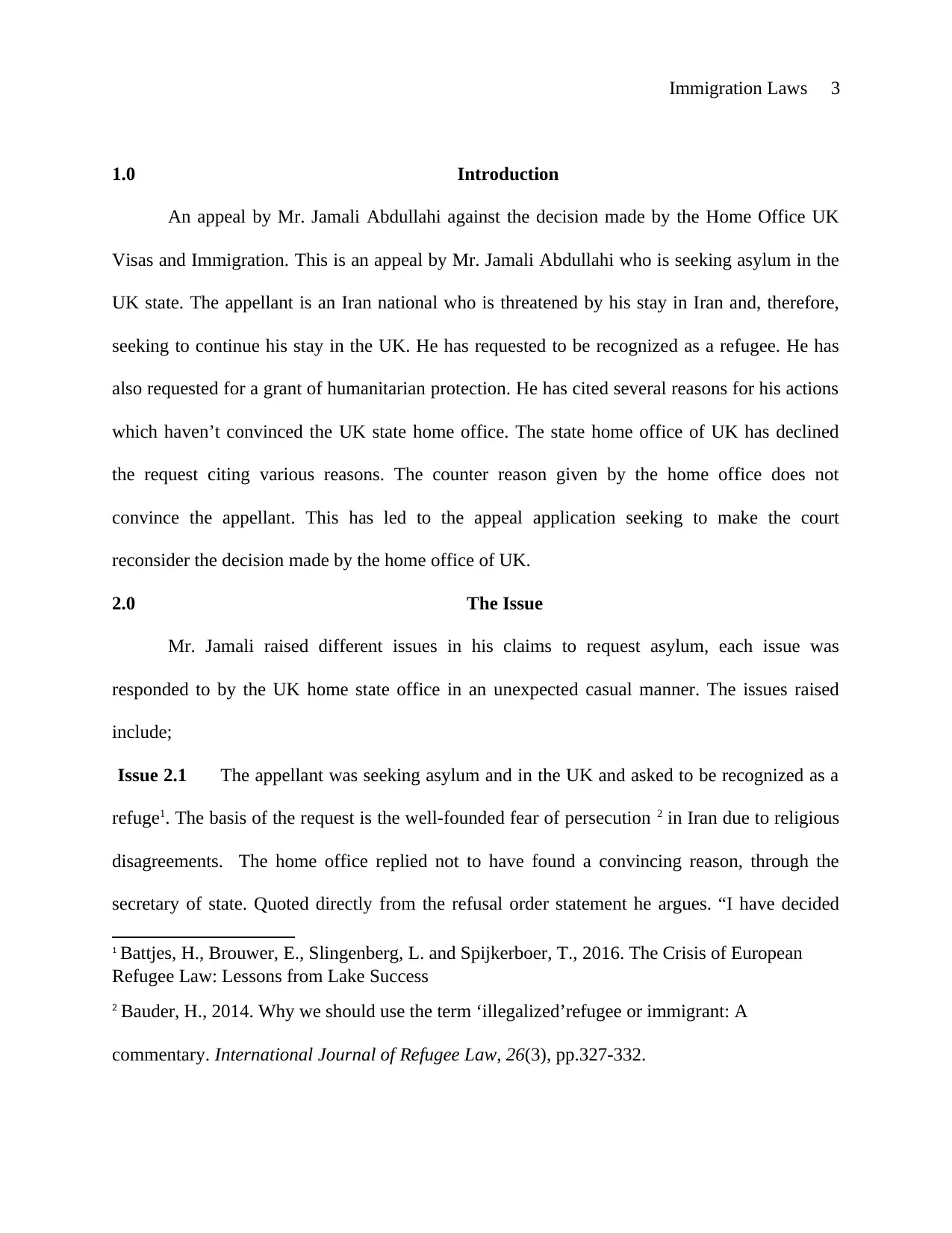
Immigration Laws 3
1.0 Introduction
An appeal by Mr. Jamali Abdullahi against the decision made by the Home Office UK
Visas and Immigration. This is an appeal by Mr. Jamali Abdullahi who is seeking asylum in the
UK state. The appellant is an Iran national who is threatened by his stay in Iran and, therefore,
seeking to continue his stay in the UK. He has requested to be recognized as a refugee. He has
also requested for a grant of humanitarian protection. He has cited several reasons for his actions
which haven’t convinced the UK state home office. The state home office of UK has declined
the request citing various reasons. The counter reason given by the home office does not
convince the appellant. This has led to the appeal application seeking to make the court
reconsider the decision made by the home office of UK.
2.0 The Issue
Mr. Jamali raised different issues in his claims to request asylum, each issue was
responded to by the UK home state office in an unexpected casual manner. The issues raised
include;
Issue 2.1 The appellant was seeking asylum and in the UK and asked to be recognized as a
refuge1. The basis of the request is the well-founded fear of persecution 2 in Iran due to religious
disagreements. The home office replied not to have found a convincing reason, through the
secretary of state. Quoted directly from the refusal order statement he argues. “I have decided
1 Battjes, H., Brouwer, E., Slingenberg, L. and Spijkerboer, T., 2016. The Crisis of European
Refugee Law: Lessons from Lake Success
2 Bauder, H., 2014. Why we should use the term ‘illegalized’refugee or immigrant: A
commentary. International Journal of Refugee Law, 26(3), pp.327-332.
1.0 Introduction
An appeal by Mr. Jamali Abdullahi against the decision made by the Home Office UK
Visas and Immigration. This is an appeal by Mr. Jamali Abdullahi who is seeking asylum in the
UK state. The appellant is an Iran national who is threatened by his stay in Iran and, therefore,
seeking to continue his stay in the UK. He has requested to be recognized as a refugee. He has
also requested for a grant of humanitarian protection. He has cited several reasons for his actions
which haven’t convinced the UK state home office. The state home office of UK has declined
the request citing various reasons. The counter reason given by the home office does not
convince the appellant. This has led to the appeal application seeking to make the court
reconsider the decision made by the home office of UK.
2.0 The Issue
Mr. Jamali raised different issues in his claims to request asylum, each issue was
responded to by the UK home state office in an unexpected casual manner. The issues raised
include;
Issue 2.1 The appellant was seeking asylum and in the UK and asked to be recognized as a
refuge1. The basis of the request is the well-founded fear of persecution 2 in Iran due to religious
disagreements. The home office replied not to have found a convincing reason, through the
secretary of state. Quoted directly from the refusal order statement he argues. “I have decided
1 Battjes, H., Brouwer, E., Slingenberg, L. and Spijkerboer, T., 2016. The Crisis of European
Refugee Law: Lessons from Lake Success
2 Bauder, H., 2014. Why we should use the term ‘illegalized’refugee or immigrant: A
commentary. International Journal of Refugee Law, 26(3), pp.327-332.
⊘ This is a preview!⊘
Do you want full access?
Subscribe today to unlock all pages.

Trusted by 1+ million students worldwide
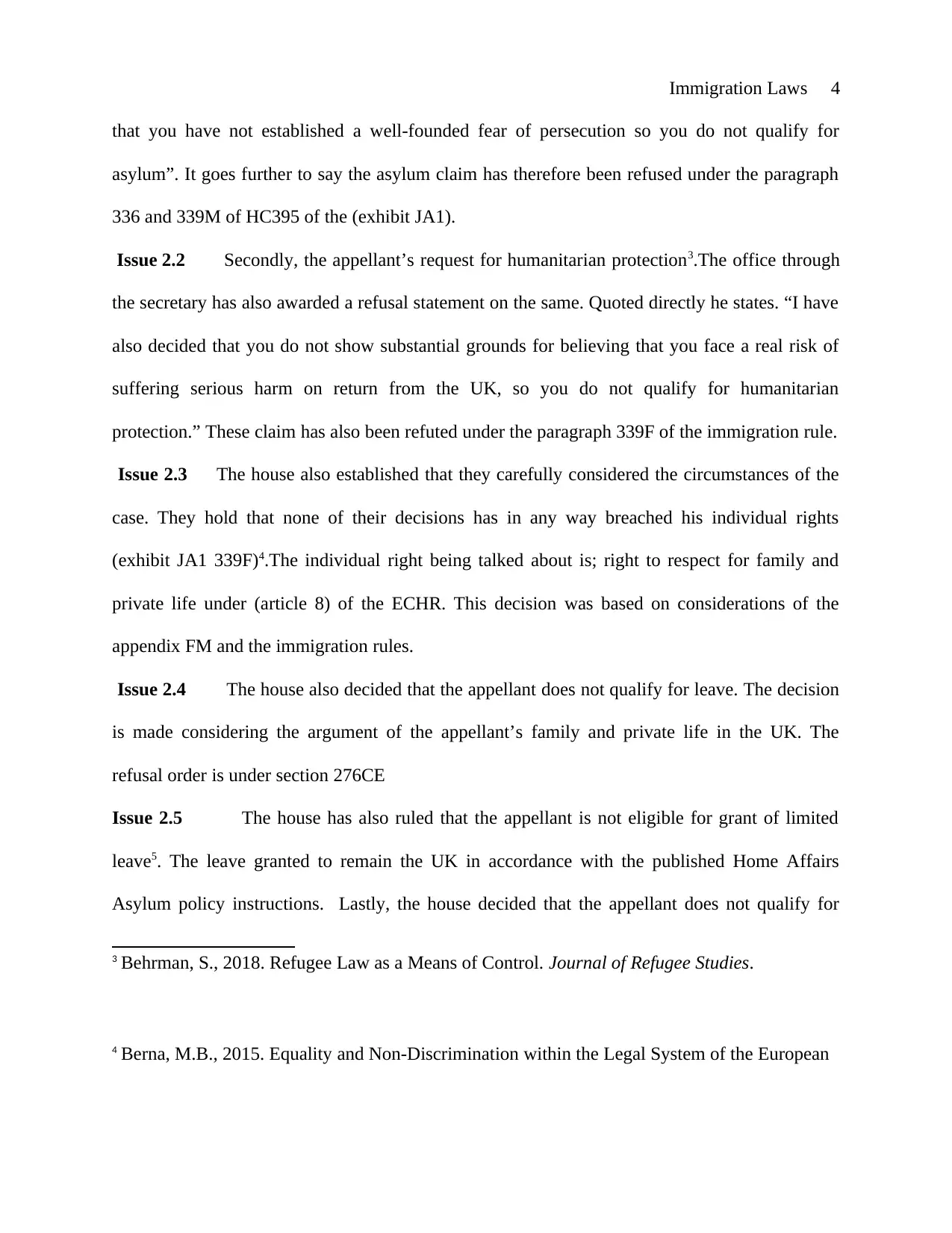
Immigration Laws 4
that you have not established a well-founded fear of persecution so you do not qualify for
asylum”. It goes further to say the asylum claim has therefore been refused under the paragraph
336 and 339M of HC395 of the (exhibit JA1).
Issue 2.2 Secondly, the appellant’s request for humanitarian protection3.The office through
the secretary has also awarded a refusal statement on the same. Quoted directly he states. “I have
also decided that you do not show substantial grounds for believing that you face a real risk of
suffering serious harm on return from the UK, so you do not qualify for humanitarian
protection.” These claim has also been refuted under the paragraph 339F of the immigration rule.
Issue 2.3 The house also established that they carefully considered the circumstances of the
case. They hold that none of their decisions has in any way breached his individual rights
(exhibit JA1 339F)4.The individual right being talked about is; right to respect for family and
private life under (article 8) of the ECHR. This decision was based on considerations of the
appendix FM and the immigration rules.
Issue 2.4 The house also decided that the appellant does not qualify for leave. The decision
is made considering the argument of the appellant’s family and private life in the UK. The
refusal order is under section 276CE
Issue 2.5 The house has also ruled that the appellant is not eligible for grant of limited
leave5. The leave granted to remain the UK in accordance with the published Home Affairs
Asylum policy instructions. Lastly, the house decided that the appellant does not qualify for
3 Behrman, S., 2018. Refugee Law as a Means of Control. Journal of Refugee Studies.
4 Berna, M.B., 2015. Equality and Non-Discrimination within the Legal System of the European
that you have not established a well-founded fear of persecution so you do not qualify for
asylum”. It goes further to say the asylum claim has therefore been refused under the paragraph
336 and 339M of HC395 of the (exhibit JA1).
Issue 2.2 Secondly, the appellant’s request for humanitarian protection3.The office through
the secretary has also awarded a refusal statement on the same. Quoted directly he states. “I have
also decided that you do not show substantial grounds for believing that you face a real risk of
suffering serious harm on return from the UK, so you do not qualify for humanitarian
protection.” These claim has also been refuted under the paragraph 339F of the immigration rule.
Issue 2.3 The house also established that they carefully considered the circumstances of the
case. They hold that none of their decisions has in any way breached his individual rights
(exhibit JA1 339F)4.The individual right being talked about is; right to respect for family and
private life under (article 8) of the ECHR. This decision was based on considerations of the
appendix FM and the immigration rules.
Issue 2.4 The house also decided that the appellant does not qualify for leave. The decision
is made considering the argument of the appellant’s family and private life in the UK. The
refusal order is under section 276CE
Issue 2.5 The house has also ruled that the appellant is not eligible for grant of limited
leave5. The leave granted to remain the UK in accordance with the published Home Affairs
Asylum policy instructions. Lastly, the house decided that the appellant does not qualify for
3 Behrman, S., 2018. Refugee Law as a Means of Control. Journal of Refugee Studies.
4 Berna, M.B., 2015. Equality and Non-Discrimination within the Legal System of the European
Paraphrase This Document
Need a fresh take? Get an instant paraphrase of this document with our AI Paraphraser
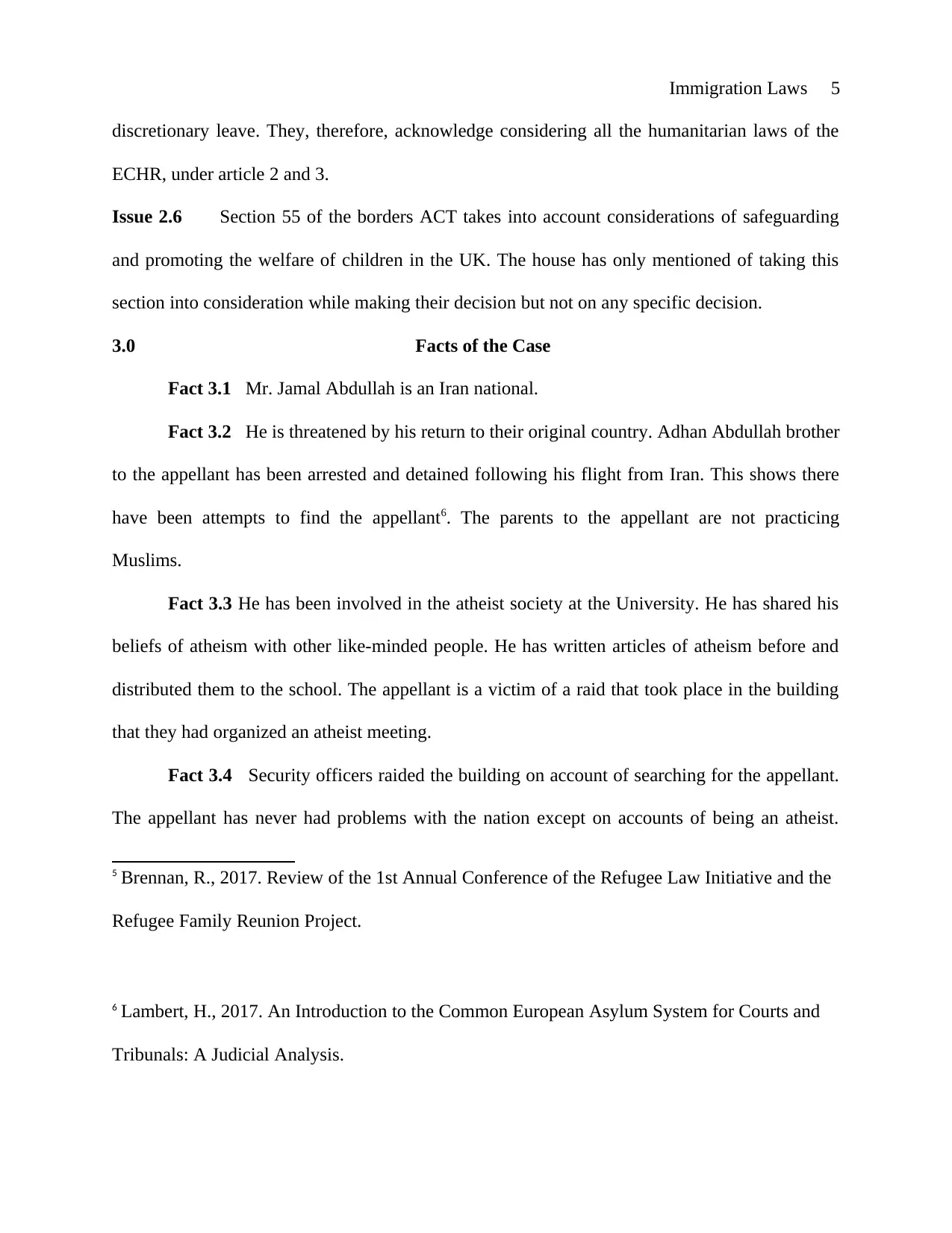
Immigration Laws 5
discretionary leave. They, therefore, acknowledge considering all the humanitarian laws of the
ECHR, under article 2 and 3.
Issue 2.6 Section 55 of the borders ACT takes into account considerations of safeguarding
and promoting the welfare of children in the UK. The house has only mentioned of taking this
section into consideration while making their decision but not on any specific decision.
3.0 Facts of the Case
Fact 3.1 Mr. Jamal Abdullah is an Iran national.
Fact 3.2 He is threatened by his return to their original country. Adhan Abdullah brother
to the appellant has been arrested and detained following his flight from Iran. This shows there
have been attempts to find the appellant6. The parents to the appellant are not practicing
Muslims.
Fact 3.3 He has been involved in the atheist society at the University. He has shared his
beliefs of atheism with other like-minded people. He has written articles of atheism before and
distributed them to the school. The appellant is a victim of a raid that took place in the building
that they had organized an atheist meeting.
Fact 3.4 Security officers raided the building on account of searching for the appellant.
The appellant has never had problems with the nation except on accounts of being an atheist.
5 Brennan, R., 2017. Review of the 1st Annual Conference of the Refugee Law Initiative and the
Refugee Family Reunion Project.
6 Lambert, H., 2017. An Introduction to the Common European Asylum System for Courts and
Tribunals: A Judicial Analysis.
discretionary leave. They, therefore, acknowledge considering all the humanitarian laws of the
ECHR, under article 2 and 3.
Issue 2.6 Section 55 of the borders ACT takes into account considerations of safeguarding
and promoting the welfare of children in the UK. The house has only mentioned of taking this
section into consideration while making their decision but not on any specific decision.
3.0 Facts of the Case
Fact 3.1 Mr. Jamal Abdullah is an Iran national.
Fact 3.2 He is threatened by his return to their original country. Adhan Abdullah brother
to the appellant has been arrested and detained following his flight from Iran. This shows there
have been attempts to find the appellant6. The parents to the appellant are not practicing
Muslims.
Fact 3.3 He has been involved in the atheist society at the University. He has shared his
beliefs of atheism with other like-minded people. He has written articles of atheism before and
distributed them to the school. The appellant is a victim of a raid that took place in the building
that they had organized an atheist meeting.
Fact 3.4 Security officers raided the building on account of searching for the appellant.
The appellant has never had problems with the nation except on accounts of being an atheist.
5 Brennan, R., 2017. Review of the 1st Annual Conference of the Refugee Law Initiative and the
Refugee Family Reunion Project.
6 Lambert, H., 2017. An Introduction to the Common European Asylum System for Courts and
Tribunals: A Judicial Analysis.
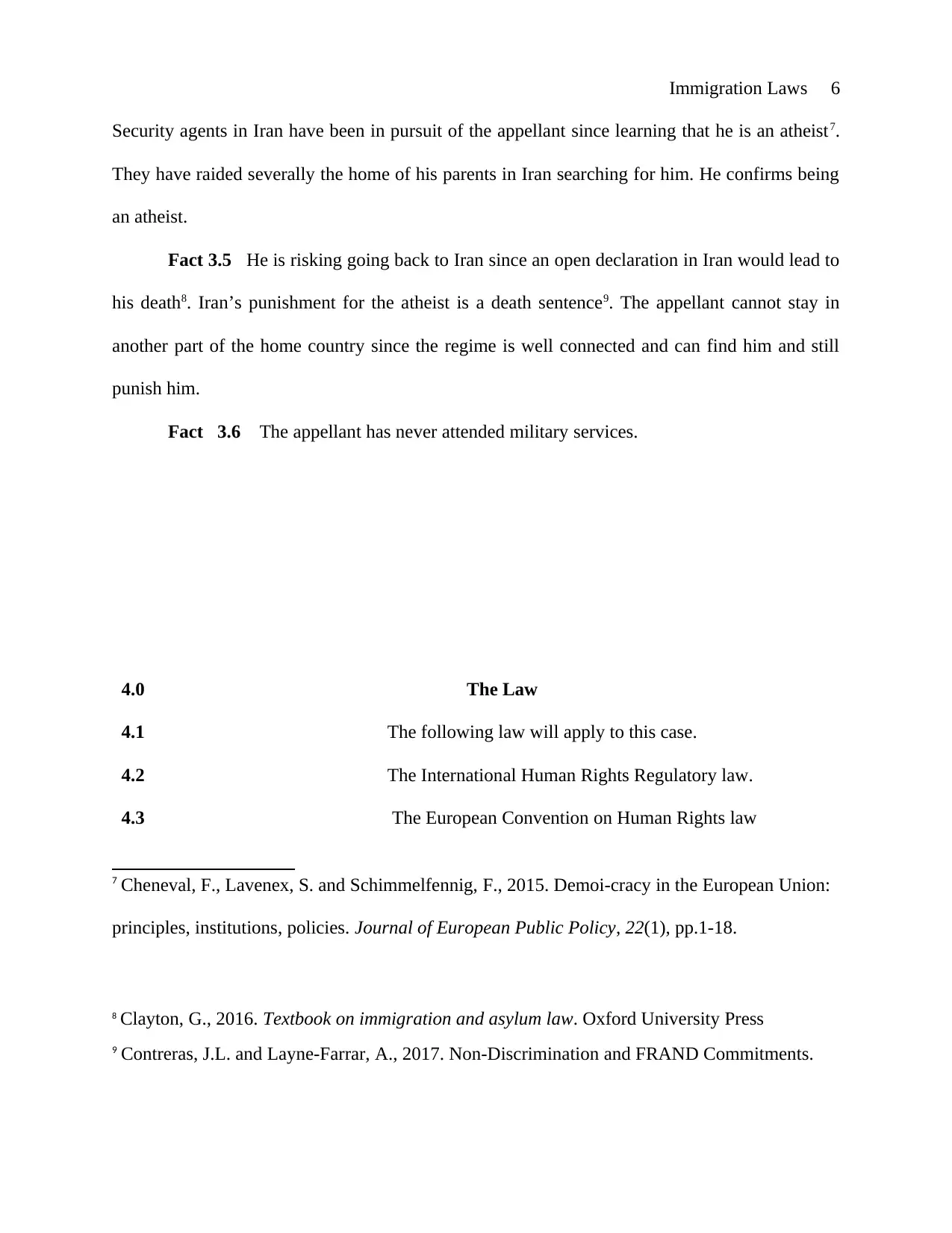
Immigration Laws 6
Security agents in Iran have been in pursuit of the appellant since learning that he is an atheist7.
They have raided severally the home of his parents in Iran searching for him. He confirms being
an atheist.
Fact 3.5 He is risking going back to Iran since an open declaration in Iran would lead to
his death8. Iran’s punishment for the atheist is a death sentence9. The appellant cannot stay in
another part of the home country since the regime is well connected and can find him and still
punish him.
Fact 3.6 The appellant has never attended military services.
4.0 The Law
4.1 The following law will apply to this case.
4.2 The International Human Rights Regulatory law.
4.3 The European Convention on Human Rights law
7 Cheneval, F., Lavenex, S. and Schimmelfennig, F., 2015. Demoi-cracy in the European Union:
principles, institutions, policies. Journal of European Public Policy, 22(1), pp.1-18.
8 Clayton, G., 2016. Textbook on immigration and asylum law. Oxford University Press
9 Contreras, J.L. and Layne-Farrar, A., 2017. Non-Discrimination and FRAND Commitments.
Security agents in Iran have been in pursuit of the appellant since learning that he is an atheist7.
They have raided severally the home of his parents in Iran searching for him. He confirms being
an atheist.
Fact 3.5 He is risking going back to Iran since an open declaration in Iran would lead to
his death8. Iran’s punishment for the atheist is a death sentence9. The appellant cannot stay in
another part of the home country since the regime is well connected and can find him and still
punish him.
Fact 3.6 The appellant has never attended military services.
4.0 The Law
4.1 The following law will apply to this case.
4.2 The International Human Rights Regulatory law.
4.3 The European Convention on Human Rights law
7 Cheneval, F., Lavenex, S. and Schimmelfennig, F., 2015. Demoi-cracy in the European Union:
principles, institutions, policies. Journal of European Public Policy, 22(1), pp.1-18.
8 Clayton, G., 2016. Textbook on immigration and asylum law. Oxford University Press
9 Contreras, J.L. and Layne-Farrar, A., 2017. Non-Discrimination and FRAND Commitments.
⊘ This is a preview!⊘
Do you want full access?
Subscribe today to unlock all pages.

Trusted by 1+ million students worldwide
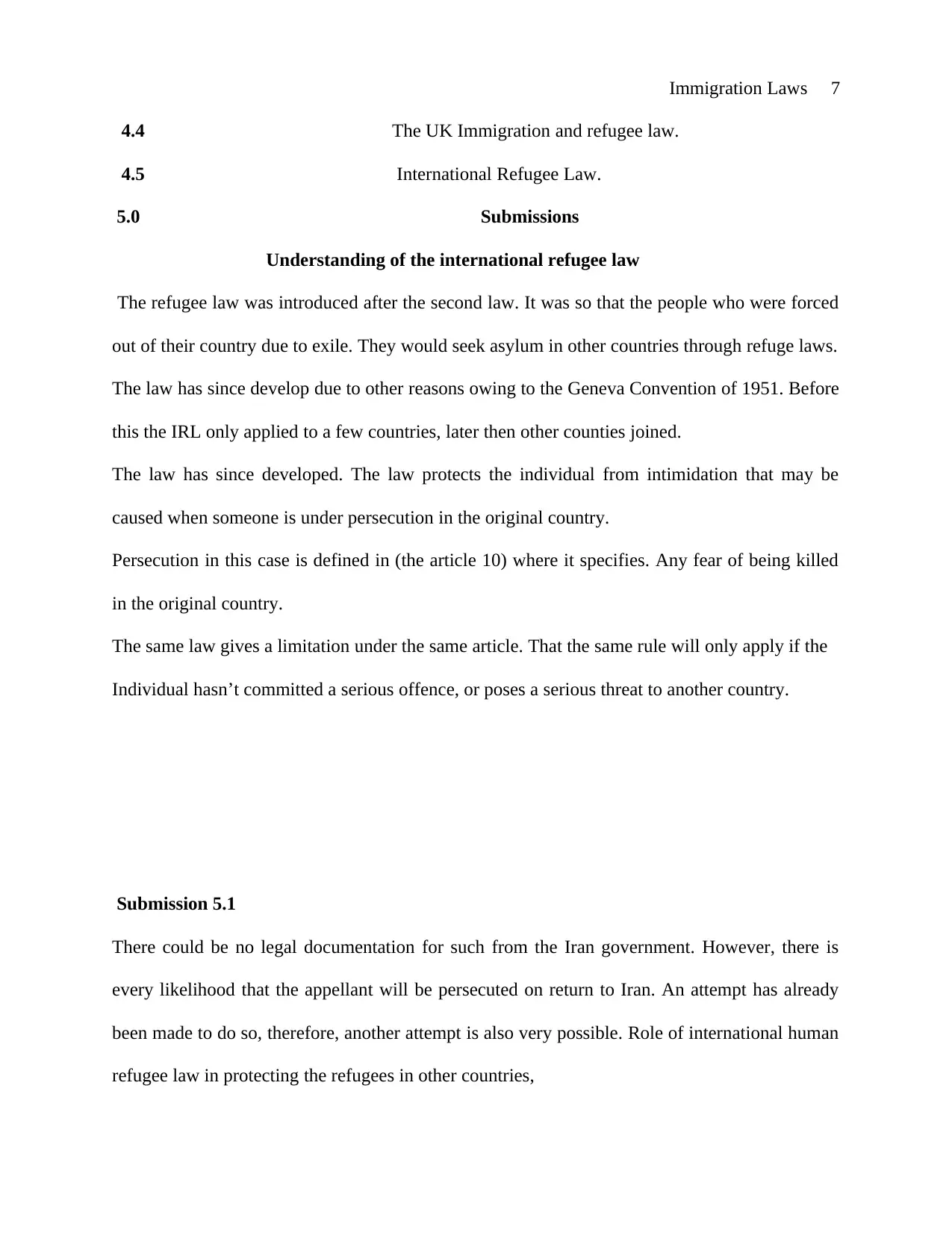
Immigration Laws 7
4.4 The UK Immigration and refugee law.
4.5 International Refugee Law.
5.0 Submissions
Understanding of the international refugee law
The refugee law was introduced after the second law. It was so that the people who were forced
out of their country due to exile. They would seek asylum in other countries through refuge laws.
The law has since develop due to other reasons owing to the Geneva Convention of 1951. Before
this the IRL only applied to a few countries, later then other counties joined.
The law has since developed. The law protects the individual from intimidation that may be
caused when someone is under persecution in the original country.
Persecution in this case is defined in (the article 10) where it specifies. Any fear of being killed
in the original country.
The same law gives a limitation under the same article. That the same rule will only apply if the
Individual hasn’t committed a serious offence, or poses a serious threat to another country.
Submission 5.1
There could be no legal documentation for such from the Iran government. However, there is
every likelihood that the appellant will be persecuted on return to Iran. An attempt has already
been made to do so, therefore, another attempt is also very possible. Role of international human
refugee law in protecting the refugees in other countries,
4.4 The UK Immigration and refugee law.
4.5 International Refugee Law.
5.0 Submissions
Understanding of the international refugee law
The refugee law was introduced after the second law. It was so that the people who were forced
out of their country due to exile. They would seek asylum in other countries through refuge laws.
The law has since develop due to other reasons owing to the Geneva Convention of 1951. Before
this the IRL only applied to a few countries, later then other counties joined.
The law has since developed. The law protects the individual from intimidation that may be
caused when someone is under persecution in the original country.
Persecution in this case is defined in (the article 10) where it specifies. Any fear of being killed
in the original country.
The same law gives a limitation under the same article. That the same rule will only apply if the
Individual hasn’t committed a serious offence, or poses a serious threat to another country.
Submission 5.1
There could be no legal documentation for such from the Iran government. However, there is
every likelihood that the appellant will be persecuted on return to Iran. An attempt has already
been made to do so, therefore, another attempt is also very possible. Role of international human
refugee law in protecting the refugees in other countries,
Paraphrase This Document
Need a fresh take? Get an instant paraphrase of this document with our AI Paraphraser
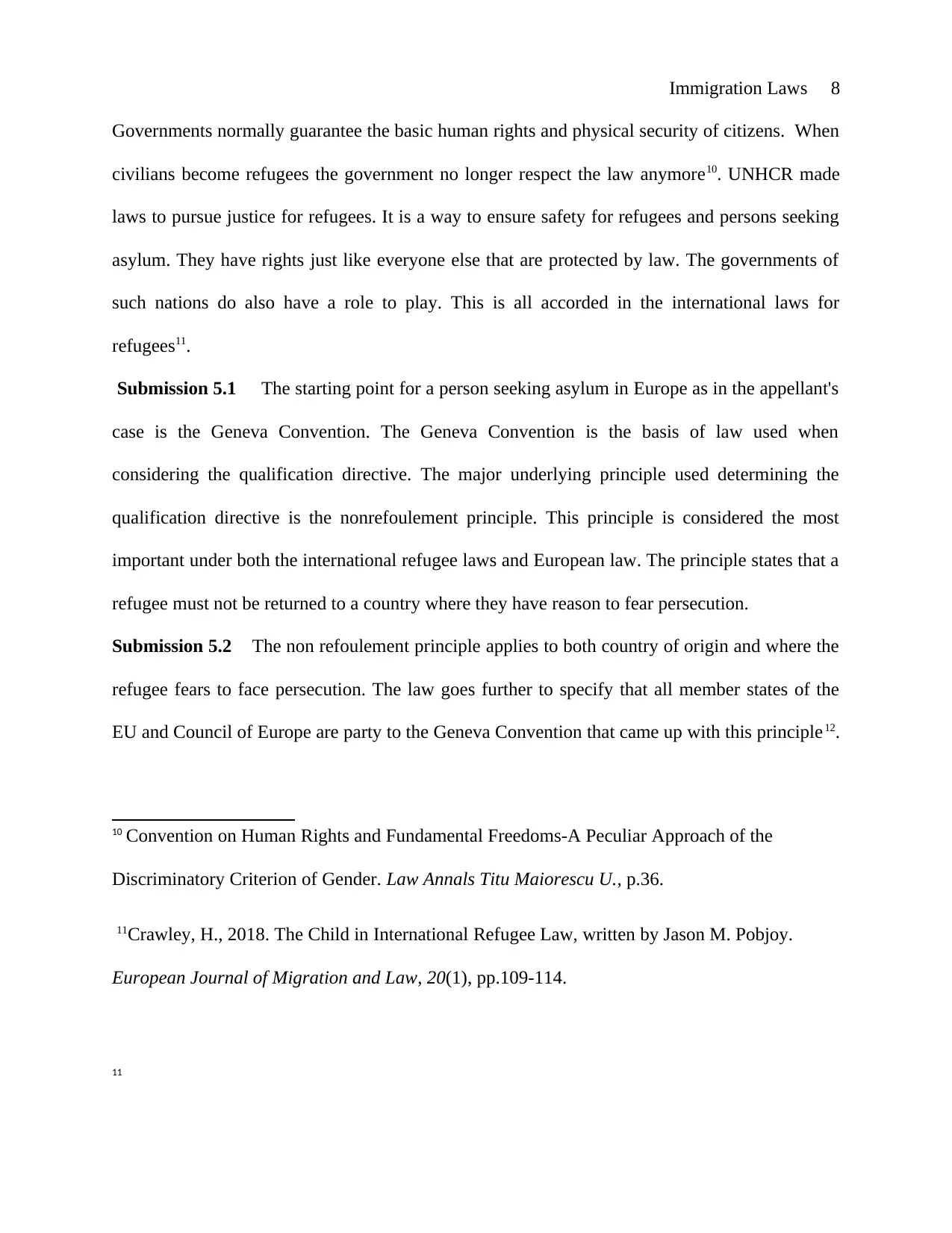
Immigration Laws 8
Governments normally guarantee the basic human rights and physical security of citizens. When
civilians become refugees the government no longer respect the law anymore10. UNHCR made
laws to pursue justice for refugees. It is a way to ensure safety for refugees and persons seeking
asylum. They have rights just like everyone else that are protected by law. The governments of
such nations do also have a role to play. This is all accorded in the international laws for
refugees11.
Submission 5.1 The starting point for a person seeking asylum in Europe as in the appellant's
case is the Geneva Convention. The Geneva Convention is the basis of law used when
considering the qualification directive. The major underlying principle used determining the
qualification directive is the nonrefoulement principle. This principle is considered the most
important under both the international refugee laws and European law. The principle states that a
refugee must not be returned to a country where they have reason to fear persecution.
Submission 5.2 The non refoulement principle applies to both country of origin and where the
refugee fears to face persecution. The law goes further to specify that all member states of the
EU and Council of Europe are party to the Geneva Convention that came up with this principle12.
10 Convention on Human Rights and Fundamental Freedoms-A Peculiar Approach of the
Discriminatory Criterion of Gender. Law Annals Titu Maiorescu U., p.36.
11Crawley, H., 2018. The Child in International Refugee Law, written by Jason M. Pobjoy.
European Journal of Migration and Law, 20(1), pp.109-114.
11
Governments normally guarantee the basic human rights and physical security of citizens. When
civilians become refugees the government no longer respect the law anymore10. UNHCR made
laws to pursue justice for refugees. It is a way to ensure safety for refugees and persons seeking
asylum. They have rights just like everyone else that are protected by law. The governments of
such nations do also have a role to play. This is all accorded in the international laws for
refugees11.
Submission 5.1 The starting point for a person seeking asylum in Europe as in the appellant's
case is the Geneva Convention. The Geneva Convention is the basis of law used when
considering the qualification directive. The major underlying principle used determining the
qualification directive is the nonrefoulement principle. This principle is considered the most
important under both the international refugee laws and European law. The principle states that a
refugee must not be returned to a country where they have reason to fear persecution.
Submission 5.2 The non refoulement principle applies to both country of origin and where the
refugee fears to face persecution. The law goes further to specify that all member states of the
EU and Council of Europe are party to the Geneva Convention that came up with this principle12.
10 Convention on Human Rights and Fundamental Freedoms-A Peculiar Approach of the
Discriminatory Criterion of Gender. Law Annals Titu Maiorescu U., p.36.
11Crawley, H., 2018. The Child in International Refugee Law, written by Jason M. Pobjoy.
European Journal of Migration and Law, 20(1), pp.109-114.
11
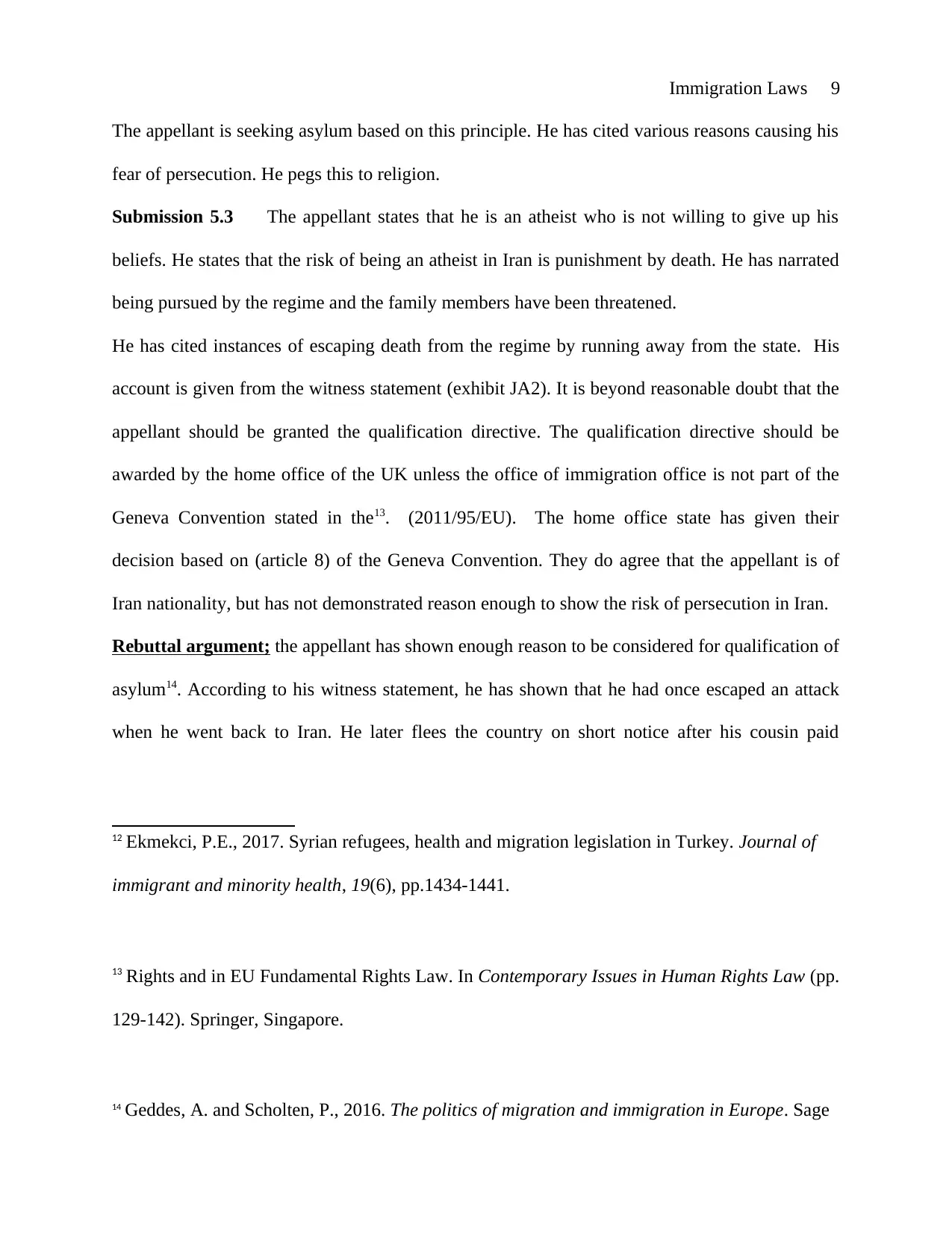
Immigration Laws 9
The appellant is seeking asylum based on this principle. He has cited various reasons causing his
fear of persecution. He pegs this to religion.
Submission 5.3 The appellant states that he is an atheist who is not willing to give up his
beliefs. He states that the risk of being an atheist in Iran is punishment by death. He has narrated
being pursued by the regime and the family members have been threatened.
He has cited instances of escaping death from the regime by running away from the state. His
account is given from the witness statement (exhibit JA2). It is beyond reasonable doubt that the
appellant should be granted the qualification directive. The qualification directive should be
awarded by the home office of the UK unless the office of immigration office is not part of the
Geneva Convention stated in the13. (2011/95/EU). The home office state has given their
decision based on (article 8) of the Geneva Convention. They do agree that the appellant is of
Iran nationality, but has not demonstrated reason enough to show the risk of persecution in Iran.
Rebuttal argument; the appellant has shown enough reason to be considered for qualification of
asylum14. According to his witness statement, he has shown that he had once escaped an attack
when he went back to Iran. He later flees the country on short notice after his cousin paid
12 Ekmekci, P.E., 2017. Syrian refugees, health and migration legislation in Turkey. Journal of
immigrant and minority health, 19(6), pp.1434-1441.
13 Rights and in EU Fundamental Rights Law. In Contemporary Issues in Human Rights Law (pp.
129-142). Springer, Singapore.
14 Geddes, A. and Scholten, P., 2016. The politics of migration and immigration in Europe. Sage
The appellant is seeking asylum based on this principle. He has cited various reasons causing his
fear of persecution. He pegs this to religion.
Submission 5.3 The appellant states that he is an atheist who is not willing to give up his
beliefs. He states that the risk of being an atheist in Iran is punishment by death. He has narrated
being pursued by the regime and the family members have been threatened.
He has cited instances of escaping death from the regime by running away from the state. His
account is given from the witness statement (exhibit JA2). It is beyond reasonable doubt that the
appellant should be granted the qualification directive. The qualification directive should be
awarded by the home office of the UK unless the office of immigration office is not part of the
Geneva Convention stated in the13. (2011/95/EU). The home office state has given their
decision based on (article 8) of the Geneva Convention. They do agree that the appellant is of
Iran nationality, but has not demonstrated reason enough to show the risk of persecution in Iran.
Rebuttal argument; the appellant has shown enough reason to be considered for qualification of
asylum14. According to his witness statement, he has shown that he had once escaped an attack
when he went back to Iran. He later flees the country on short notice after his cousin paid
12 Ekmekci, P.E., 2017. Syrian refugees, health and migration legislation in Turkey. Journal of
immigrant and minority health, 19(6), pp.1434-1441.
13 Rights and in EU Fundamental Rights Law. In Contemporary Issues in Human Rights Law (pp.
129-142). Springer, Singapore.
14 Geddes, A. and Scholten, P., 2016. The politics of migration and immigration in Europe. Sage
⊘ This is a preview!⊘
Do you want full access?
Subscribe today to unlock all pages.

Trusted by 1+ million students worldwide
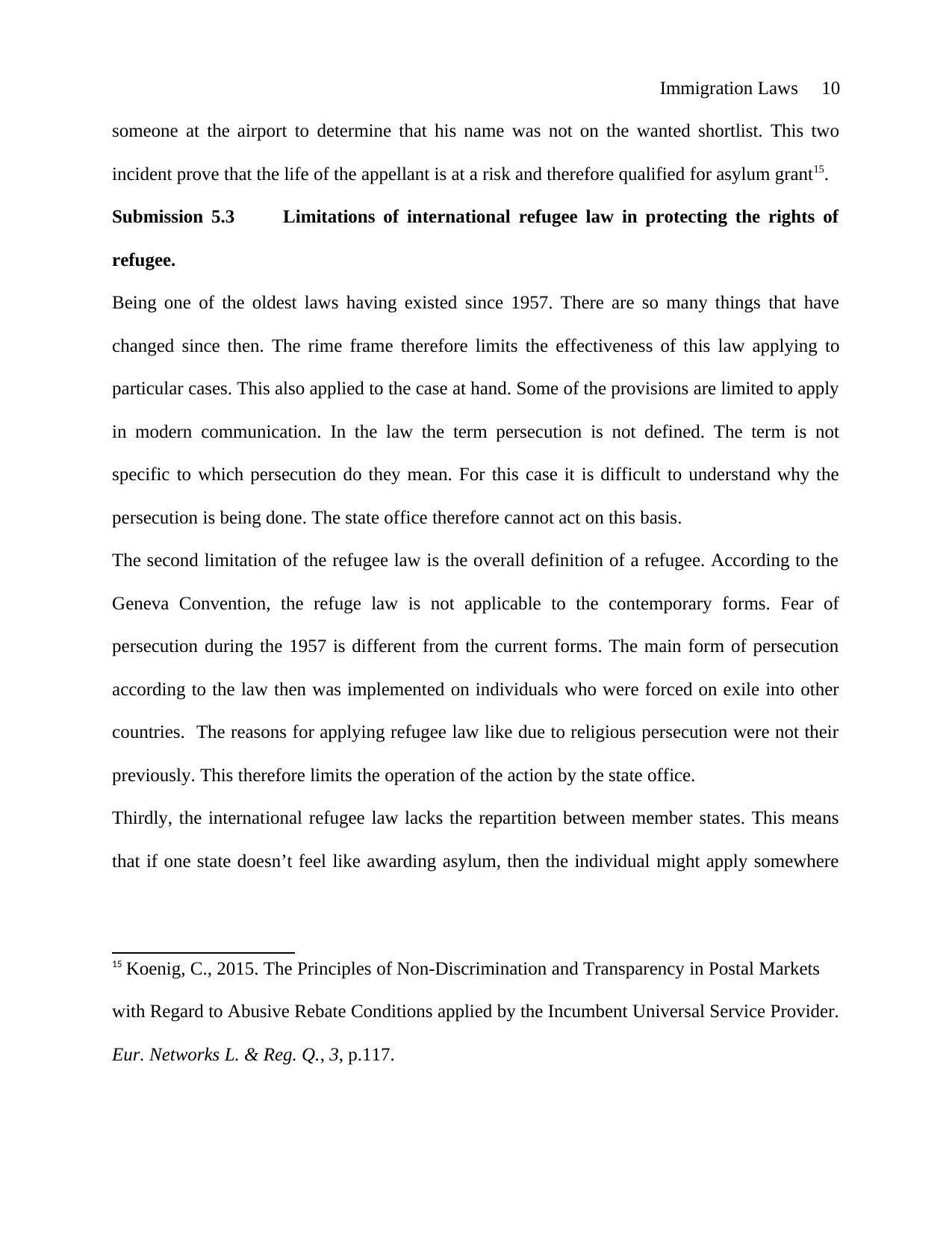
Immigration Laws 10
someone at the airport to determine that his name was not on the wanted shortlist. This two
incident prove that the life of the appellant is at a risk and therefore qualified for asylum grant15.
Submission 5.3 Limitations of international refugee law in protecting the rights of
refugee.
Being one of the oldest laws having existed since 1957. There are so many things that have
changed since then. The rime frame therefore limits the effectiveness of this law applying to
particular cases. This also applied to the case at hand. Some of the provisions are limited to apply
in modern communication. In the law the term persecution is not defined. The term is not
specific to which persecution do they mean. For this case it is difficult to understand why the
persecution is being done. The state office therefore cannot act on this basis.
The second limitation of the refugee law is the overall definition of a refugee. According to the
Geneva Convention, the refuge law is not applicable to the contemporary forms. Fear of
persecution during the 1957 is different from the current forms. The main form of persecution
according to the law then was implemented on individuals who were forced on exile into other
countries. The reasons for applying refugee law like due to religious persecution were not their
previously. This therefore limits the operation of the action by the state office.
Thirdly, the international refugee law lacks the repartition between member states. This means
that if one state doesn’t feel like awarding asylum, then the individual might apply somewhere
15 Koenig, C., 2015. The Principles of Non-Discrimination and Transparency in Postal Markets
with Regard to Abusive Rebate Conditions applied by the Incumbent Universal Service Provider.
Eur. Networks L. & Reg. Q., 3, p.117.
someone at the airport to determine that his name was not on the wanted shortlist. This two
incident prove that the life of the appellant is at a risk and therefore qualified for asylum grant15.
Submission 5.3 Limitations of international refugee law in protecting the rights of
refugee.
Being one of the oldest laws having existed since 1957. There are so many things that have
changed since then. The rime frame therefore limits the effectiveness of this law applying to
particular cases. This also applied to the case at hand. Some of the provisions are limited to apply
in modern communication. In the law the term persecution is not defined. The term is not
specific to which persecution do they mean. For this case it is difficult to understand why the
persecution is being done. The state office therefore cannot act on this basis.
The second limitation of the refugee law is the overall definition of a refugee. According to the
Geneva Convention, the refuge law is not applicable to the contemporary forms. Fear of
persecution during the 1957 is different from the current forms. The main form of persecution
according to the law then was implemented on individuals who were forced on exile into other
countries. The reasons for applying refugee law like due to religious persecution were not their
previously. This therefore limits the operation of the action by the state office.
Thirdly, the international refugee law lacks the repartition between member states. This means
that if one state doesn’t feel like awarding asylum, then the individual might apply somewhere
15 Koenig, C., 2015. The Principles of Non-Discrimination and Transparency in Postal Markets
with Regard to Abusive Rebate Conditions applied by the Incumbent Universal Service Provider.
Eur. Networks L. & Reg. Q., 3, p.117.
Paraphrase This Document
Need a fresh take? Get an instant paraphrase of this document with our AI Paraphraser
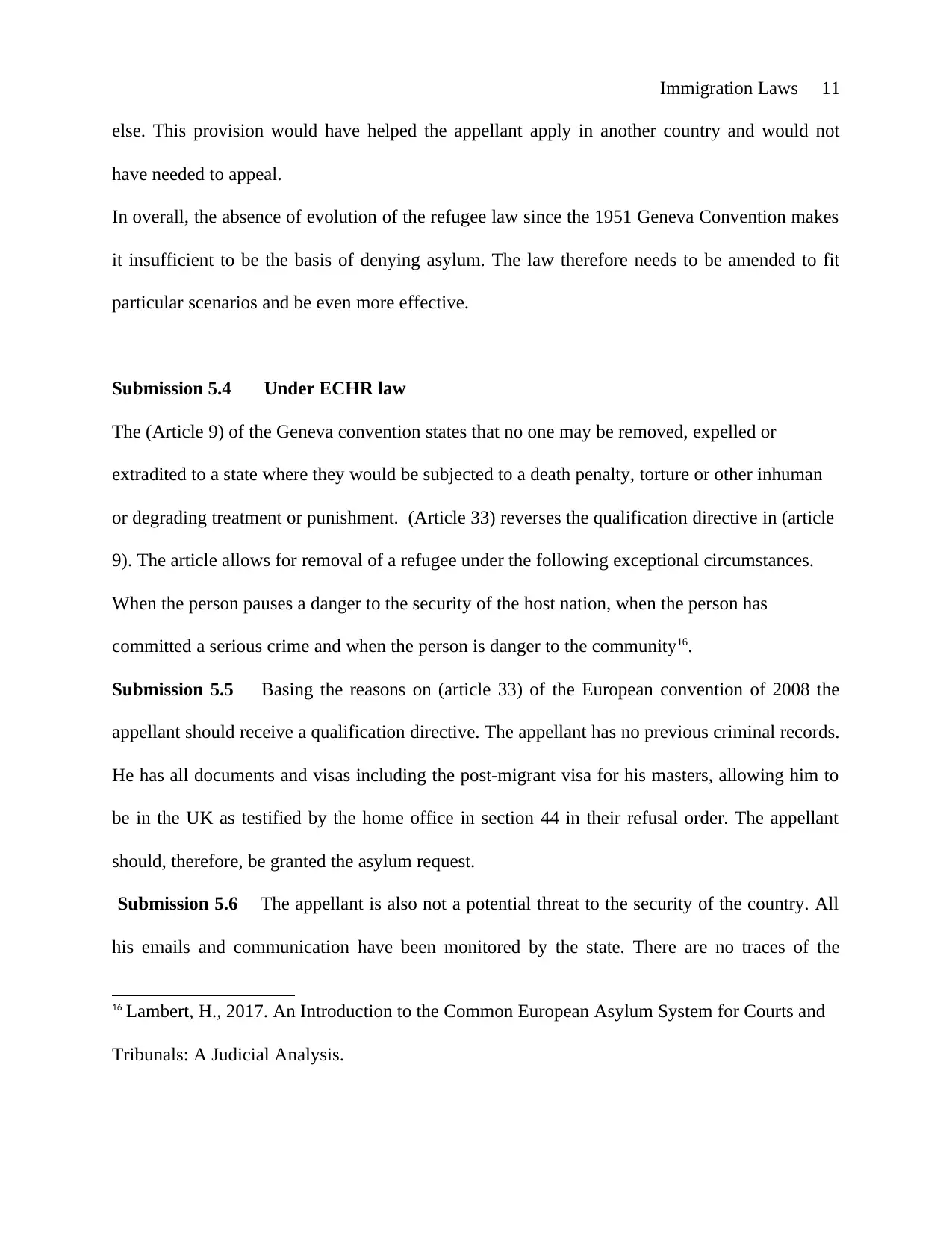
Immigration Laws 11
else. This provision would have helped the appellant apply in another country and would not
have needed to appeal.
In overall, the absence of evolution of the refugee law since the 1951 Geneva Convention makes
it insufficient to be the basis of denying asylum. The law therefore needs to be amended to fit
particular scenarios and be even more effective.
Submission 5.4 Under ECHR law
The (Article 9) of the Geneva convention states that no one may be removed, expelled or
extradited to a state where they would be subjected to a death penalty, torture or other inhuman
or degrading treatment or punishment. (Article 33) reverses the qualification directive in (article
9). The article allows for removal of a refugee under the following exceptional circumstances.
When the person pauses a danger to the security of the host nation, when the person has
committed a serious crime and when the person is danger to the community16.
Submission 5.5 Basing the reasons on (article 33) of the European convention of 2008 the
appellant should receive a qualification directive. The appellant has no previous criminal records.
He has all documents and visas including the post-migrant visa for his masters, allowing him to
be in the UK as testified by the home office in section 44 in their refusal order. The appellant
should, therefore, be granted the asylum request.
Submission 5.6 The appellant is also not a potential threat to the security of the country. All
his emails and communication have been monitored by the state. There are no traces of the
16 Lambert, H., 2017. An Introduction to the Common European Asylum System for Courts and
Tribunals: A Judicial Analysis.
else. This provision would have helped the appellant apply in another country and would not
have needed to appeal.
In overall, the absence of evolution of the refugee law since the 1951 Geneva Convention makes
it insufficient to be the basis of denying asylum. The law therefore needs to be amended to fit
particular scenarios and be even more effective.
Submission 5.4 Under ECHR law
The (Article 9) of the Geneva convention states that no one may be removed, expelled or
extradited to a state where they would be subjected to a death penalty, torture or other inhuman
or degrading treatment or punishment. (Article 33) reverses the qualification directive in (article
9). The article allows for removal of a refugee under the following exceptional circumstances.
When the person pauses a danger to the security of the host nation, when the person has
committed a serious crime and when the person is danger to the community16.
Submission 5.5 Basing the reasons on (article 33) of the European convention of 2008 the
appellant should receive a qualification directive. The appellant has no previous criminal records.
He has all documents and visas including the post-migrant visa for his masters, allowing him to
be in the UK as testified by the home office in section 44 in their refusal order. The appellant
should, therefore, be granted the asylum request.
Submission 5.6 The appellant is also not a potential threat to the security of the country. All
his emails and communication have been monitored by the state. There are no traces of the
16 Lambert, H., 2017. An Introduction to the Common European Asylum System for Courts and
Tribunals: A Judicial Analysis.
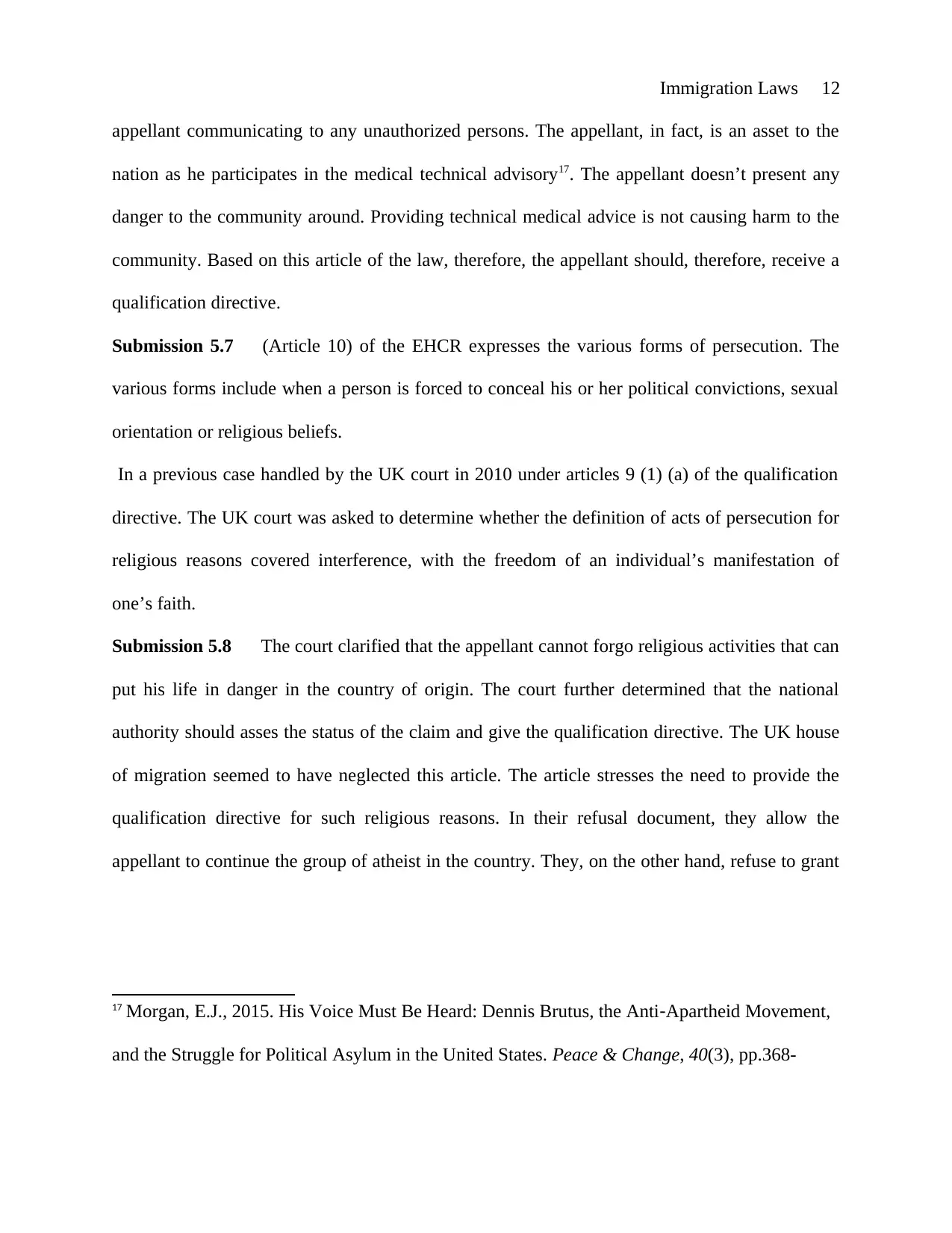
Immigration Laws 12
appellant communicating to any unauthorized persons. The appellant, in fact, is an asset to the
nation as he participates in the medical technical advisory17. The appellant doesn’t present any
danger to the community around. Providing technical medical advice is not causing harm to the
community. Based on this article of the law, therefore, the appellant should, therefore, receive a
qualification directive.
Submission 5.7 (Article 10) of the EHCR expresses the various forms of persecution. The
various forms include when a person is forced to conceal his or her political convictions, sexual
orientation or religious beliefs.
In a previous case handled by the UK court in 2010 under articles 9 (1) (a) of the qualification
directive. The UK court was asked to determine whether the definition of acts of persecution for
religious reasons covered interference, with the freedom of an individual’s manifestation of
one’s faith.
Submission 5.8 The court clarified that the appellant cannot forgo religious activities that can
put his life in danger in the country of origin. The court further determined that the national
authority should asses the status of the claim and give the qualification directive. The UK house
of migration seemed to have neglected this article. The article stresses the need to provide the
qualification directive for such religious reasons. In their refusal document, they allow the
appellant to continue the group of atheist in the country. They, on the other hand, refuse to grant
17 Morgan, E.J., 2015. His Voice Must Be Heard: Dennis Brutus, the Anti‐Apartheid Movement,
and the Struggle for Political Asylum in the United States. Peace & Change, 40(3), pp.368-
appellant communicating to any unauthorized persons. The appellant, in fact, is an asset to the
nation as he participates in the medical technical advisory17. The appellant doesn’t present any
danger to the community around. Providing technical medical advice is not causing harm to the
community. Based on this article of the law, therefore, the appellant should, therefore, receive a
qualification directive.
Submission 5.7 (Article 10) of the EHCR expresses the various forms of persecution. The
various forms include when a person is forced to conceal his or her political convictions, sexual
orientation or religious beliefs.
In a previous case handled by the UK court in 2010 under articles 9 (1) (a) of the qualification
directive. The UK court was asked to determine whether the definition of acts of persecution for
religious reasons covered interference, with the freedom of an individual’s manifestation of
one’s faith.
Submission 5.8 The court clarified that the appellant cannot forgo religious activities that can
put his life in danger in the country of origin. The court further determined that the national
authority should asses the status of the claim and give the qualification directive. The UK house
of migration seemed to have neglected this article. The article stresses the need to provide the
qualification directive for such religious reasons. In their refusal document, they allow the
appellant to continue the group of atheist in the country. They, on the other hand, refuse to grant
17 Morgan, E.J., 2015. His Voice Must Be Heard: Dennis Brutus, the Anti‐Apartheid Movement,
and the Struggle for Political Asylum in the United States. Peace & Change, 40(3), pp.368-
⊘ This is a preview!⊘
Do you want full access?
Subscribe today to unlock all pages.

Trusted by 1+ million students worldwide
1 out of 22
Your All-in-One AI-Powered Toolkit for Academic Success.
+13062052269
info@desklib.com
Available 24*7 on WhatsApp / Email
![[object Object]](/_next/static/media/star-bottom.7253800d.svg)
Unlock your academic potential
Copyright © 2020–2026 A2Z Services. All Rights Reserved. Developed and managed by ZUCOL.

